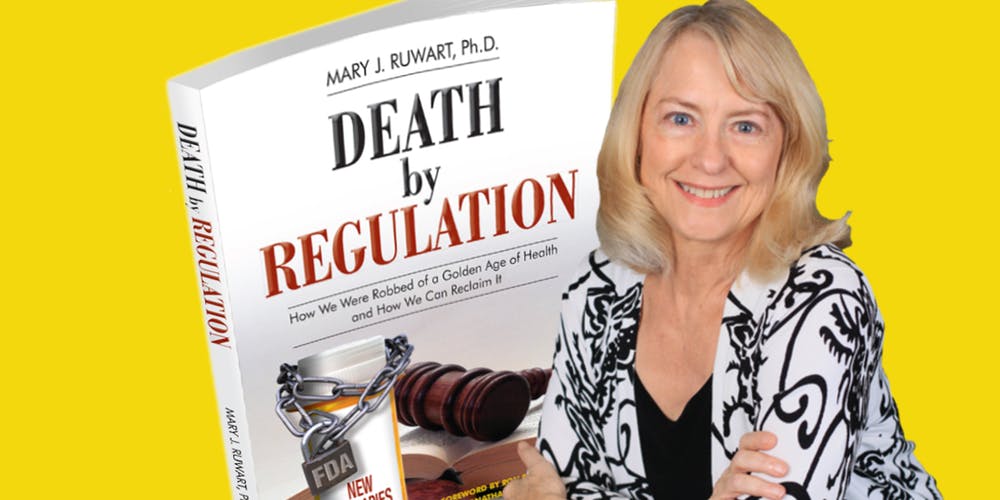We were honored to interview Dr. Mary J. Ruwart, a research scientist, ethicist, and a libertarian author/activist. She received her B.S. in biochemistry in 1970 and her Ph.D. in Biophysics in 1974 (both from Michigan State University). She subsequently joined the Department of Surgery at St. Louis University and left her Assistant Professorship there to accept a position with The Upjohn Company of Kalamazoo, Michigan in 1976. As a senior research scientist, Dr. Ruwart was involved in developing new therapies for a variety of diseases, including liver cirrhosis and AIDS.
She is the author of Healing Our World: The Compassion of Libertarianism, published in 2015, and the focus of our interview is her latest book is Death by Regulation: How We Were Robbed of a Golden Age of Health and How We Can Reclaim It, published this year.
You can learn more about Mary and her work at: http://www.ruwart.com.
Ed’s Questions
Your book Death by Regulation is more horrific than a Stephen King novel, because it’s real. It all starts with children of thalidomide doesn’t it?
Before the 1962 Amendments a drug had to be “safe for the intended use.” But after the Amendments a drug had to show it was “safe and effective.” Why is this difference so important and what has it done for us?
Makers of water could not advertise that it alleviates dehydration [due to FDA regulations]. But how are Cheerios and cherries drugs?
Healthful snack or new "drug?" According to the FDA it is the latter.
Even the Centers for Disease Control and the FDA contradict one another in some cases?
There’s so many therapies where you’re using your own cells, stem cells, etc., will these be regulated as a drug?
One of the things we’ve noticed about many leaders in business is that they treat data as if they have a substance abuse problem. Like drugs, they get a little data and they more and more. The FDA demands more and more data from every study. Does the FDA has a data substance problem?
Ron’s Questions
You write prescription drugs, properly prescribed, killed 106,000 in 1994 alone (the 4th to 6th leading cause of death in the USA). I guess drugs, even approved ones, are controlled poison?
You conservatively estimate at least half of the Americans who died since 1962 have lost more than a decade of their lives because of the 1962 Amendments to the Food and Drug Act. Unpack for us why researchers look at years off of live rather than number of deaths.
You discuss off-label use of a drug, such as aspirin to help prevent heart attacks and strokes, yet the FDA doesn’t allow drug companies to market this fact, or even to inform doctors. Is that right?
You discuss the high price of drug prices and how many people attribute this to greed, which is a terrible theory—like blaming gravity for airplane crashes. Greed and gravity are a constant, so we can’t blame change on a constant. You say the real culprit is the FDA approval process, and because of the 1962 Amendments the average price of drugs increased 40 times. Real drug prices fell 32% from 1949-61, prior to the Amendments. Drug companies are constantly maligned and impugned in the press, by politicians, the media, etc. You worked for Upjohn for 19 years, how did you put up with these negative accusations?
As you say, the first patent holder to market usually captures 90% of the market, so that approval is really important.
Another statistic you point out is how drugs lower other health care costs: $3.65 saved in medical expenses for every $1 invested in drugs. It’s something of which most people don’t seem to be aware.
The FDA can make two types of errors: approve a drug that kills people (like Vioxx), or not approve a drug that could save the lives of many people. One of the economists we interviewed, Steven Landsburg, proposes that the FDA commissioner be paid in pharmaceutical stock as a way to lessen the incentive to only commit the second type of error. What’s your take on that proposal?
Is the FDA more harmful than helpful? "Yes," according to Dr. Mary Ruwart.
You recommend three remedies:
Repeal the 1962 Amendments
Revoke FDA’s ability to approve new drugs. Instead, it makes reviews, recommendations, or certifications
Pass the Health Freedom act (HR 2117) to nullify court decision that making a health claim for a food or nutrient makes it a drug
You point out that desperate patients make drugs in their kitchens, enter the black market, or buy from foreign countries. You also point out that surgeons didn’t need FDA approval for knee and hip replacement surgeries, important innovations. Of course, there are downsides: cardiac bypass was overused, etc. But it leads to more innovation which ultimately saves more lives than it costs.
You quote Dale H. Gieringer, a Cato Analyst: “FDA regulation certainly cannot be proved ‘safe and effective,’ thereby flunking its own approval criterion.” I don’t know how anyone can read your book and not come to the same conclusion.
Science isn’t good enough no matter who the decision maker is—the FDA, patient, or doctor. The best we can hope for is an informed decision.





